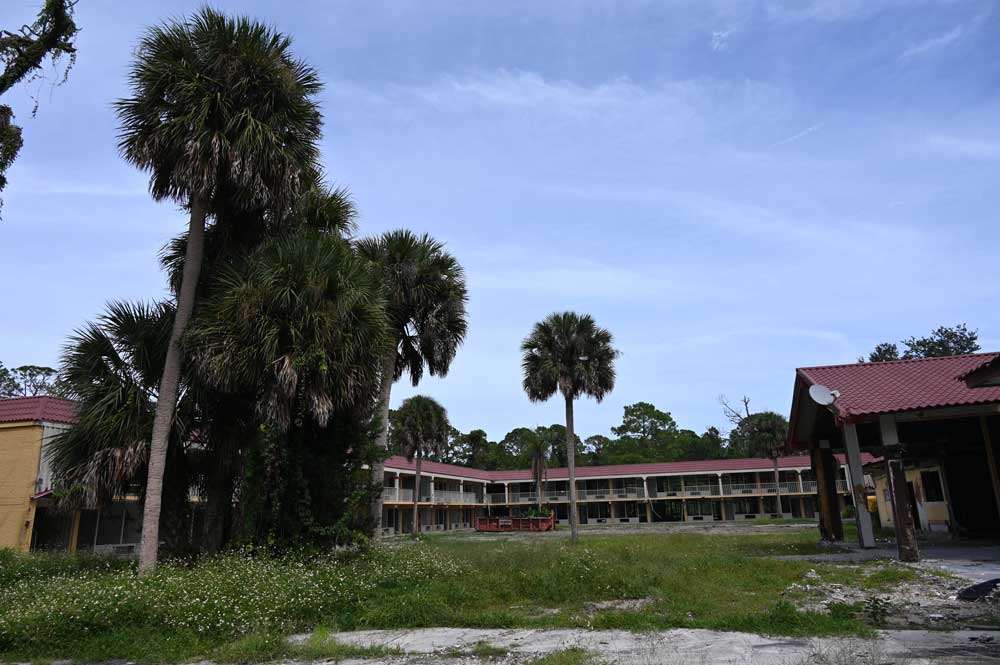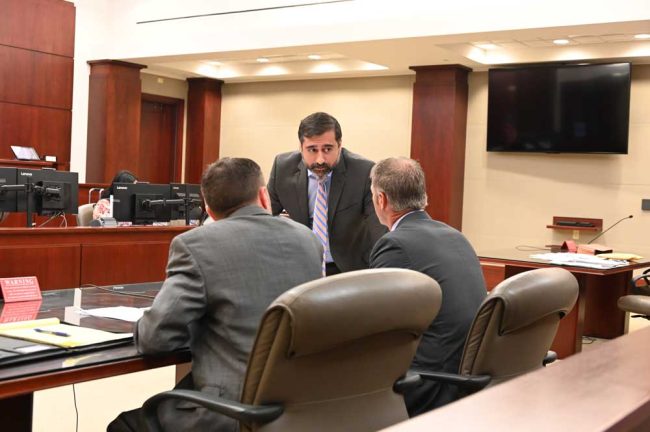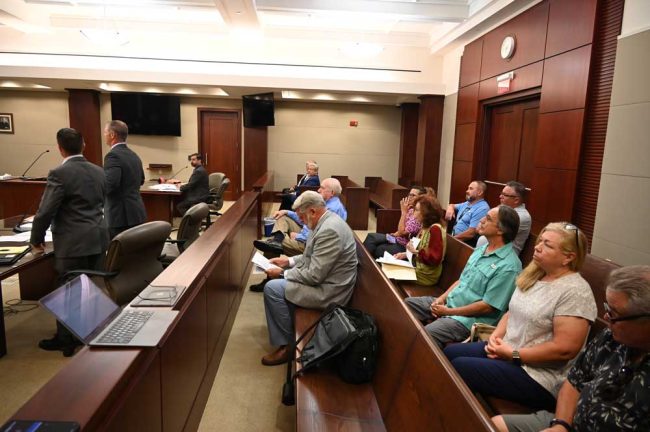
Flagler County government and the attorney representing the always-mysterious owners of the derelict Old Dixie Motel argued in front of Circuit Judge Chris France today about a three-year-old contract requiring safety and construction benchmarks. The county considers the contract valid. The owners do not.
The county considers the contract valid. The owners do not.
The judge will issue a ruling on the contract’s validity in the near future, though if his questions were any indication today, France is skeptical of the motel owners’ position.
Meanwhile, in a separate, administrative move through its own Code Enforcement Department, the county will seek to validate a demolition order before a magistrate on June 5.
The old motel has sat unused, dilapidated and at times hazardous for years. Three years ago e New York-based entity called 2251 S Old Dixie Hwy LLC bought the motel property from previous owners whom the county had sued for over the building’s code and health violations. The new owners agreed to pay the fines, meet the county’s code conditions, and rebuild the structure into a functioning motel. The county wanted the company to put up a $250,000 bond that the county would use to pay for building demolition if the company did not meet its obligations.
The company never put up the bond and its attorney today told France rather brazenly that it doesn’t intend to, because it doesn’t consider valid the contract it signed with the county three years ago. It considers the contract “illusory” and “unconscionable,” and a “mistake.”
The company says it met realistic demands, but not unrealistic ones: it cleaned up the grounds, fenced them in, and filled in the pool.
The county doesn’t dispute that. But the county argues that the company had also pledged to get the building reconstructed, yet three years later, it hasn’t applied for any substantial permits other than to seal the roof. There’s been no plumbing, no electrical work, no fire suppressant system, no water. That means the building is still not up to code. The company claims it couldn’t have any of those things because it’s a construction site.
But what construction? There hasn’t been any construction in three years, the county says. “What they have not done and have not done as we sit here today is actually sought any permits and perform any of the renovations described under section three B of the agreement,” Abraham McKinnon, the attorney representing the county alongside Assistant County Attorney Sean Moylan, told the court. “As a result, they were again notified of these conditions. And in addition to failing to perform those tasks, they refused to deposit with the Clerk of the Court the $250,000, so this lawsuit then proceeded forward against them related to this particular contract, and as well as the condition of the property.”

Theodore D’Appuzzo, who represents the building owners–they were not in court, but their project manager, local Realtor Greg Kong, was–contested the county’s characterization, though at times in terms that stretched credibility, at least to residents near the motel grounds who have seen a vacancy of activity there. “This is not a building that is abandoned. This is an active construction site with active permits where work has been done, hundreds of thousands of dollars work has been done,” D’Appuzzo said, “and what the county is asking for my clients to do or to force them to do is to post a bond, the underlying reason which is no longer there.”
For example, he said, the original 99-day deadline to obtain permits was “impossible,” he said, just as to finish initial work demands in 21 days was not possible. “What what is my client to do with this, and what is the county to do with this?” D’Appuzzo asked, though it wasn’t exactly clear what he meant by this, other than speaking a general sense of exasperation.
France was interested in more precision: “You have no intention of posting the bond?”
“The fear that my client has, is–” D’Appuzzo started, before the judge cut him off.
“It’s a yes or no. What are we doing?”

“Given the state of the contract, correct. The intention is not to not post the bond,” D’Appuzzo said. “If your honor were to limit or otherwise restrict the contract, it may, it may be an enforceable contract. As drafted this contract is not enforceable.” The county, he said, intends to demolish the building, which “would be an economic waste.” But again: it was not clear how the disused motel and its 8.5 acres of property have been something other than an “economic waste”: the building is valued at $300,000, according to the property appraiser, only a little more than the median homesteaded single family house in the county–down from $2.7 million in 2009. The property pays about $2,400 in property taxes to the county every year, possibly enough to cover the cost of the sheriff’s dispatchers and deputies who respond to policing issues in or around its periphery.
When D’Appuzzo again asserted that the county had placed his clients in an “impossible” situation to meet contractual demands, France had another simple question for him: how does the court “close the gap” between the “impossible” and the “unwise”? The client, France said, “didn’t have to sign it. He didn’t have to buy it.”
The court may find that a contract is invalid for being impossible. But it cannot find the signing of a contract unwise.
D’Appuzzo hesitated a moment, then spoke of the county having “uneven bargaining power” at the time when it put the contract forward, since it could bargain with the fines that had to be paid. But he at no p[oint gave any indication of when any substantial work might take place at the “construction site.”
There is no timetable for the judge to issue a ruling.
Oddly, the same owners who bought the motel have bought numerous adjoining properties since, under a different name, Dixie Commons Development LLC, Yom 2150 S Old Dixie Hwy LLC and 278 Storage LLC, among others, the latter a 7.5-acre tract on the south side of Old Dixie Highway used as a storage facility, and where the owners are seeking to add RV and boat storage. The properties are registered under different names with the Division of Corporations, but they all have one name in common: Manuel Gomez, one of the owners of the motel property. The other is David Shebiro.
![]()










